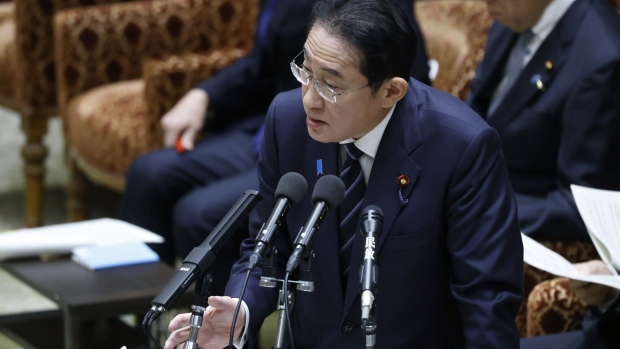Feb 5, 2024
Japan PM Says Fighter Plane Exports Wouldn’t Breach Peace Ethic
, Bloomberg News

(Bloomberg) -- Japanese Prime Minister Fumio Kishida said exporting a fighter jet that’s set to be developed with the UK and Italy would not breach his country’s pacifist principles, as the ruling coalition struggles to reach agreement on allowing the step.
Defense ministers from the three countries signed a treaty in Tokyo in December to develop the next-generation jet, in what is known as the Global Combat Air Program. The aim is to reach the development phase by 2025 and have the aircraft in service by 2035.
“Each instance of overseas transfer would be investigated strictly, and there would be appropriate management after the transfer,” Kishida said Monday in parliament. “It would not be against the basic principles of a country of peace.”
Bound since 1947 by a US-drafted pacifist constitution, Japan for decades also effectively banned arms exports. Growing concerns about China’s military might have prompted Japan to hike its defense spending and gradually change its stance on overseas sales.
While Japan recently changed its rules to allow exports of PAC-3 missiles to the US, sales by Japan of the new plane to third parties would still not be allowed.
Read more: Japan, UK and Italy Sign Treaty to Develop Joint Fighter Jet
With discussions among the main GCAP contractors on the division of labor set to begin in March, Kishida added that he wanted the coalition to reach a decision on exporting the plane by the end of this month.
“The larger the scale of international production, the lower the procurement price will be,” he said. “Therefore we believe that transfer to third countries is important.”
Former Defense Minister Itsunori Onodera said in an interview in December that members of the ruling Liberal Democratic Party’s Buddhist-backed coalition partner, Komeito, remained opposed to allowing overseas sales of the plane after 23 meetings.
©2024 Bloomberg L.P.







